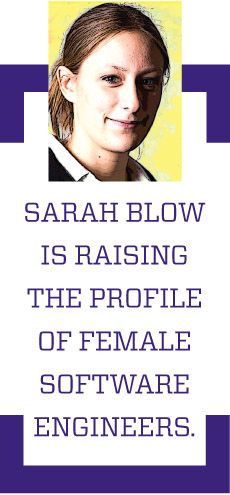Geek Girl Pride
BY THOMAS K. GROSE
Dinner, IT, and the Y Chromosome
London — Five years ago, while working for a healthcare company, software engineer Sarah Blow joined a male colleague at a networking dinner for techies. Like other similar events she had attended, it was an overwhelmingly male affair. She was mostly ignored until one of the men turned to her and asked bluntly, “Why are you here?” But when Blow’s colleague was posed a question abut programming, he replied, “I’ll let Sarah answer that.” Joining the conversation, she then made a point of displaying the binary watch on her arm. The penny dropped, as the table of geeks suddenly realized she was one of them. “They all went completely white,” Blow recounts, with a chuckle.
The next day, Blow blogged about the episode, making the suggestion that women
techies stage their own events. The idea elicited so many encouraging comments that Blow decided to go for it. Thus was born Girl Geek Dinners, a networking organization for women in technology that’s since gone global.
Blow’s concept for the ladies’ events was simple. Only women were invited, and men could attend only if accompanied by a female. The first Girl Geek Dinner attracted 35 people, of whom six were male. “That was good enough to get us started,” Blow recalls. One attendee worked for Microsoft, and the company subsequently contacted Blow with the proposal that it sponsor future events. Most are now sponsored by companies such as
Microsoft, Google, and eBay. Sue Haber, diversity and inclusiveness manager for Google’s European operations, has praised Blow for raising the profile of women in an industry that’s still male dominated and for “generating a buzz.” Diversity is important to Google, “so Girl Geek Dinners was a good fit for us,” says Haber. The Internet giant has sponsored Geek dinners in cities from Amsterdam to Sydney and San Francisco.
In the United Kingdom, 11 cities now have chapters, each of which stages six to eight dinners a year, typically drawing 60 to 80 people, and occasionally as many as 150. They remain predominantly female events, and the mix of attendees ranges from hard-core software engineers to people who work in marketing for tech companies. “It’s really for anyone who is interested in technology and considers herself a geek,” Blow explains.
Sarah Blow’s geek bona fides are certainly indisputable. The 29-year-old holds a bachelor’s degree and a master’s in computer science from the University of Manchester and currently works for Tweetmeme, a Twitter-based news aggregator. Last year, she handed over the reins of her original organization, now called Girl Geek Dinners London, in order to oversee the group’s international expansion.
They began branching out overseas in their second year, when chapters opened in Belgium and Italy. Girl Geek Dinners now has chapters in 77 cities in 26 countries, including America, Australia, and Turkey. There are several U.S. city chapters, among them New York, Seattle, and San Francisco. “It’s ramping up quite quickly,” Blow says.
The chapters in the United Kingdom are also taking additional steps to raise the profile of women in technology, such as hosting special events for girls and their teachers at secondary schools. Getting young girls interested in technology is important in a country where only 16 percent of the tech workforce is female. Chapter members are also encouraged to make themselves available for media interviews, because too few news stories about technology quote female experts. Blow is particularly interested in getting stories into women’s magazines.
Asked whether her efforts to improve the tech community’s recognition of – and sensitivity to – its women members have been successful, Blow answers in the affirmative. Recent surveys that Geek Girl Dinners conducted in Britain generated mostly positive responses. And now when women attend traditional geek dinners, “they’re usually treated with more respect.”
Although Girl Geek Dinners is growing rapidly, Blow has no plans to commercialize the organization, which remains a nonprofit entity. “It’s my hobby,” she says. “I don’t want to make money out of it.” Clearly geekiness and altruism can mix.
Thomas K. Grose is Prism’s chief correspondent, based in the United Kingdom.
Category: Up Close
